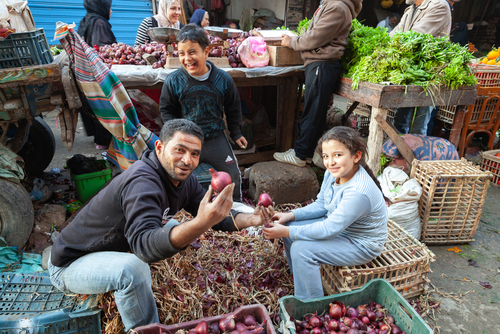Strolling through Egyptian streets, markets, and smaller neighborhoods, one often hears expressions like khaly ‘alena or etfadalo ma’ana. Yet, whether they are empty words or a serious invitation – we rarely stop to think about what they tell us about Egyptian culture.
The Sailor’s Invitation and Its Cultural Interpretation
Invitation phrases that are not always meant to be taken literally permeate Egyptian daily life. Khaly ‘alena can be translated as “Leave it to us” or “Let us take care of it” and is commonly used as an invitation to cover expenses.
The statement is not reserved for acquaintances, but equally prevalent among complete strangers, and even in commercial settings such as local shops and restaurants. Etfadalo ma’ana, meaning “Join us”, are very common words to hear when you pass by a group of people who are eating food, and serve as an invitation to partake in their gathering.
In Egyptian Arabic, there is a term for such statements: ‘ozumet ‘marakbeya, which literally translates to a “sailor’s invitation” – an invitation that is virtually impossible to fulfill.
The story goes that, in the past, sailors would invite people standing on the shore or other passing boats to drink tea or share a meal with them from inside their moving boats: an act that is more of a social nicety than a genuine invitation.
As a result, this expression became associated with stingy individuals who do not want to sincerely follow through on their invitations. If you try to explain the term ‘ozumet marakbeya to a non-Arabic speaking friend, the closest equivalent would therefore be ‘lip service’, – though it is not entirely accurate, as it is not specific to invitations.
Hospitality in Neighboring Cultures
Neighboring cultures, like Persian or Turkish cultures, interpret such statements rather differently: more of a gesture of hospitality than an insincere invitation.
In Persian culture, there is an entire etiquette system called Taarof that encompasses and expands upon our concept of Ozumet Marakbeya. Taarof involves offering what is yours to others, even if you do not actually mean it, as a sign of respect or courtesy. It also involves not easily accepting what others offer to you, even if you genuinely want it.
Interestingly, the word Taarof comes from the Arabic word تعارف ta’aruf, which can be roughly translated as “getting acquainted” and carries a much more positive connotation than our word Ozumet Marakbeya.
In Turkish culture, while not as distinct from other etiquette forms as in Persian culture, actions that we identify as Ozumet Marakbeya are encompassed within the broader notion of Incelik. There isn’t a single English word that precisely encapsulates the meaning of Incelik, but expressions like “gracefulness” or “gentility” can convey a similar essence of the concept.
Both Persian Taarof and Turkish Incelik have strikingly similar practices to ours. When you’re about to pay for something in a shop, you are most likely going to hear the salesperson decline your payment saying “Ghabel nadare” in Iran, and “Or bizden olsun” in Turkey, which respectively translate to “Money is insignificant compared to your value” and “Let it be from us” – the equivalents to the Egyptian Khaly ‘alena.
Inviting someone to your house at an inconvenient time after they have given you a ride or spontaneously asking someone to join you for a meal even though you do not have enough food, with the expectation of that invitation being declined, is also not unusual in those cultures.
These unrealistic offers mirror our own, which makes one wonder why the way other cultures interpret and label offering etiquette is so different from the way we do.
Arabic Transcends Literalness in Social Interaction
It is true that the concept of Ozumet marakbeya can sometimes cause confusion and differing expectations in social interactions, but Arabic in general is a language that transcends literal interpretation in all realms of social interaction. Its speakers often find themselves uttering words that do not necessarily align with their true intentions, but rather, serve to convey a broader sentiment.
In Egyptian colloquial Arabic, there is a rich collection of such phrases, among which Men 3eyouny (from my eyes) stands out as one of the most frequently used and yet most challenging to translate. This expression signifies a willingness to grant someone whatever they desire, even if it means sacrificing something as precious as one’s own eyes, disregarding any personal cost.
Similarly, the phrase taht amrak/amrek (Under your command) and its more casual version Enta/enty to2mor/y (You command) symbolize an immediate readiness to comply with others’ wishes. While these sentences may appear too serious or even submissive when taken literally, they find their place in everyday conversations, even among close friends.
Though these expressions may not literally imply absolute obedience or sacrifice, and even if a salesperson saying Khaly ‘alena does not literally mean you shouldn’t pay, why is it that we interpret such words as stinginess rather than an attempt to create a sense of familiarity, the feeling of ‘eshra?
’eshareya is a word that I always find very difficult to translate, but it describes the attempt to act as if you have known someone for a long time, even though you may have just met them.
And if I were to encapsulate the essence of Egyptians to someone unfamiliar with their ways, I would simply describe them as ‘eshareyeen, masters of forging instant connections and creating an immediate sense of closeness and familiarity. Even if it may appear as mere empty words, Ozumet Marakbeya is but one of the many expressions of that attribute.
Subscribe to the Egyptian Streets’ weekly newsletter! Catch up on the latest news, arts & culture headlines, exclusive features and more stories that matter, delivered straight to your inbox by clicking here.







Comments (8)
[…] post Cultural Gestures of Hospitality: Ozumet Marakbeya and its Cultural Counterparts first appeared on Egyptian […]
[…] Source link […]